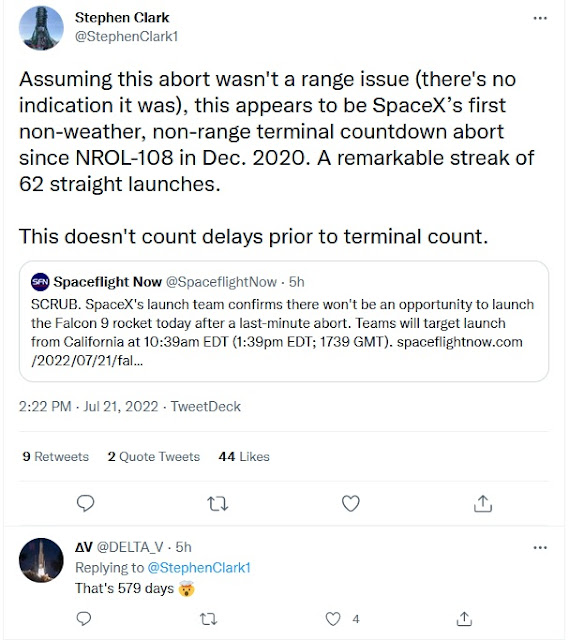Let me lead with the story itself. Today's planned Starlink 3-2 launch
from Vandenberg Space Force Station was aborted 46 seconds before
liftoff and has been rescheduled for tomorrow. It was the first
time that SpaceX has aborted a terminal countdown for something other than a
range violation that I could recall. It turns out I couldn't recall it
for a good reason: it has been a long time and a lot of launches. Stephen Clark, editor of
Spaceflight Now,
Tweeted this summary.
That's 19 months practically to the day; the NROL-108 launch that Clark mentions was on December 19th. Considering that they've been launching at an average of once every 6.4 days so far this year, that's a remarkable record.
Yes, the launch business has changed to the point where an issue during countdowns causing a delay is considered very strange. As Ars Technica reports,
This year the Falcon 9 rocket has launched every 6.4 days and lofted more than 300,000 kg into low Earth orbit. This is considerably more than every other country and company in the world combined.
As reported already, they have conducted 31 successful launches so far in '22. For a comparison of launch rates, Ars traced back the launches by SpaceX's largest US competitor, United Launch Alliance.
To put this cadence into perspective, consider the flight rate of SpaceX's main US-based competitor, United Launch Alliance. Counting both its Delta and Atlas fleets, ULA launched its last 31 rockets from March 19, 2017, to the present day. That's a cadence of one launch every 64 days.
Put another way, SpaceX is now launching at a rate of 10 rockets to every one of its main American competitor. Both companies have 100 percent success rates during this time period.
A minor feature of this launch is that it's the
fastest launch pad turnaround
ever at Vandenberg SFS. Assuming that the launch is tomorrow or even the
next day, they'll still set that record. The existing record is 22 days,
11 hours. Today's launch would have been 10 days, 14 hours.
Tomorrow still puts the turnaround at half the existing record. Which is also
SpaceX's record.
Just as we hardly note when commercial airliners take off and land on time,
the day is coming - if it's not here already - when it will be
considered just as unnoticeable when rocket launches go off on time.
Maybe this column itself is evidence that day is already here.

Wife Unit and I were at 39A watching the Banabandu-1 mission, when the computer decided something wasn't right at T-59 seconds.
ReplyDeleteFound out later it was an error flag that got set during the AGE equipment tests and some software engineer forgot to reset the flag. Computer noticed it and called the whole thing to a halt, the second attempt reset to 15 minutes later, same thing, and the third time the launch window closed.
The next day it was totally successful. It sure gets hot watching it in the stands in May! Worth it, though.
If one lives within earshot of a missile range, one does not miss when a missile launches. Nor do one's neighbors' dogs.
ReplyDeleteI'm far enough away that the sound doesn't get here until it's too late to go outside and see anything. It's OK if we're out there, but between the time delay and not knowing where to look, it's too late go start looking. Sometimes we get a short little rumble, other times it goes for minutes.
DeleteToday's do-over for the Starlink mission was successful including sticking the landing of the booster on JRTI offshore Baja Mexico.
The Starlink launch made it today with another successfully stuck landing by the first stage. I was watching the video of it landing and saw it rotate for orientation when it landed.
ReplyDelete